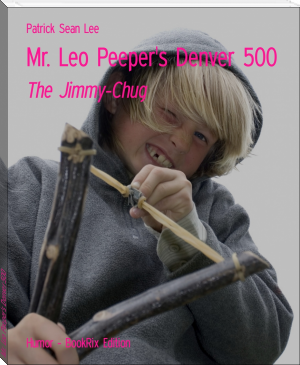The Head of Kay's by P. G. Wodehouse (online e book reading .TXT) 📖

- Author: P. G. Wodehouse
Book online «The Head of Kay's by P. G. Wodehouse (online e book reading .TXT) 📖». Author P. G. Wodehouse
Tea was just over at Blackburn's, and the bulk of the house had gone across to preparation in the school buildings. The prefects, as was their custom, lingered on to finish the meal at their leisure. These after-tea conversations were quite an institution at Blackburn's. The labours of the day were over, and the time for preparation for the morrow had not yet come. It would be time to be thinking of that in another hour. Meanwhile, a little relaxation might be enjoyed. Especially so as this was the last day but two of the summer term, and all necessity for working after tea had ceased with the arrival of the last lap of the examinations.
Silver was head of the house, and captain of its cricket team, which was nearing the end of its last match, the final for the inter-house cup, and—on paper—getting decidedly the worst of it. After riding in triumph over the School House, Bedell's, and Mulholland's, Blackburn's had met its next door neighbour, Kay's, in the final, and, to the surprise of the great majority of the school, was showing up badly. The match was affording one more example of how a team of average merit all through may sometimes fall before a one-man side. Blackburn's had the three last men on the list of the first eleven, Silver, Kennedy, and Challis, and at least nine of its representatives had the reputation of being able to knock up a useful twenty or thirty at any time. Kay's, on the other hand, had one man, Fenn. After him the tail started. But Fenn was such an exceptional all-round man that, as Silver had said, he was as good as half-a-dozen of the Blackburn's team, equally formidable whether batting or bowling—he headed the school averages at both. He was one of those batsmen who seem to know exactly what sort of ball you are going to bowl before it leaves your hand, and he could hit like another Jessop. As for his bowling, he bowled left hand—always a puzzling eccentricity to an undeveloped batsman—and could send them down very fast or very slow, as he thought best, and it was hard to see which particular brand he was going to serve up before it was actually in mid-air.
But it is not necessary to enlarge on his abilities. The figures against his name in Wisden prove a good deal. The fact that he had steered Kay's through into the last round of the house-matches proves still more. It was perfectly obvious to everyone that, if only you could get Fenn out for under ten, Kay's total for that innings would be nearer twenty than forty. They were an appalling side. But then no house bowler had as yet succeeded in getting Fenn out for under ten. In the six innings he had played in the competition up to date, he had made four centuries, an eighty, and a seventy.
Kennedy, the second prefect at Blackburn's, paused in the act of grappling with the remnant of a pot of jam belonging to some person unknown, to reply to Silver's remarks.
"We aren't beaten yet," he said, in his solid way. Kennedy's chief characteristics were solidity, and an infinite capacity for taking pains. Nothing seemed to tire or discourage him. He kept pegging away till he arrived. The ordinary person, for instance, would have considered the jam-pot, on which he was then engaged, an empty jam-pot. Kennedy saw that there was still a strawberry (or it may have been a section of a strawberry) at the extreme end, and he meant to have that coy vegetable if he had to squeeze the pot to get at it. To take another instance, all the afternoon of the previous day he had bowled patiently at Fenn while the latter lifted every other ball into space. He had been taken off three times, and at every fresh attack he had plodded on doggedly, until at last, as he had expected, the batsman had misjudged a straight one, and he had bowled him all over his wicket. Kennedy generally managed to get there sooner or later.
"It's no good chucking the game up simply because we're in a tight place," he said, bringing the spoon to the surface at last with the section of strawberry adhering to the end of it. "That sort of thing's awfully feeble."
"He calls me feeble!" shouted Jimmy Silver. "By James, I've put a man to sleep for less."
It was one of his amusements to express himself from time to time in a melodramatic fashion, sometimes accompanying his words with suitable gestures. It was on one of these occasions—when he had assumed at a moment's notice the role of the "Baffled Despot", in an argument with Kennedy in his study on the subject of the house football team—that he broke what Mr Blackburn considered a valuable door with a poker. Since then he had moderated his transports.
"They've got to make seventy-nine," said Kennedy.
Challis, the other first eleven man, was reading a green scoring-book.
"I don't think Kay's ought to have the face to stick the cup up in their dining-room," he said, "considering the little they've done to win it. If they do win it, that is. Still, as they made two hundred first innings, they ought to be able to knock off seventy-nine. But I was saying that the pot ought to go to Fenn. Lot the rest of the team had to do with it. Blackburn's, first innings, hundred and fifty-one; Fenn, eight for forty-nine. Kay's, two hundred and one; Fenn, a hundred and sixty-four not out. Second innings, Blackburn's hundred and twenty-eight; Fenn ten for eighty. Bit thick, isn't it? I suppose that's what you'd call a one-man team."
Williams, one of the other prefects, who had just sat down at the piano for the purpose of playing his one tune—a cake-walk, of which, through constant practice, he had mastered the rudiments—spoke over his shoulder to Silver.
"I tell you what, Jimmy," he said, "you've probably lost us the pot by getting your people to send brother Billy to Kay's. If he hadn't kept up his wicket yesterday, Fenn wouldn't have made half as many."
When his young brother had been sent to Eckleton two terms before, Jimmy Silver had strongly urged upon his father the necessity of placing him in some house other than Blackburn's. He felt that a head of a house, even of so orderly and perfect a house as Blackburn's, has enough worries without being saddled with a small brother. And on the previous afternoon young Billy Silver, going in eighth wicket for Kay's, had put a solid bat in front of everything for the space of one hour, in the course of which he made ten runs and Fenn sixty. By scoring odd numbers off the last ball of each over, Fenn had managed to secure the majority of the bowling in the most masterly way.
"These things will happen," said Silver, resignedly. "We Silvers, you know, can't help making runs. Come on, Williams, let's have that tune, and get it over."
Williams obliged. It was a classic piece called "The Coon Band Contest", remarkable partly for a taking melody, partly for the vast possibilities of noise which it afforded. Williams made up for his failure to do justice to the former by a keen appreciation of the latter. He played the piece through again, in order to correct the mistakes he had made at his first rendering of it. Then he played it for the third time to correct a new





Comments (0)